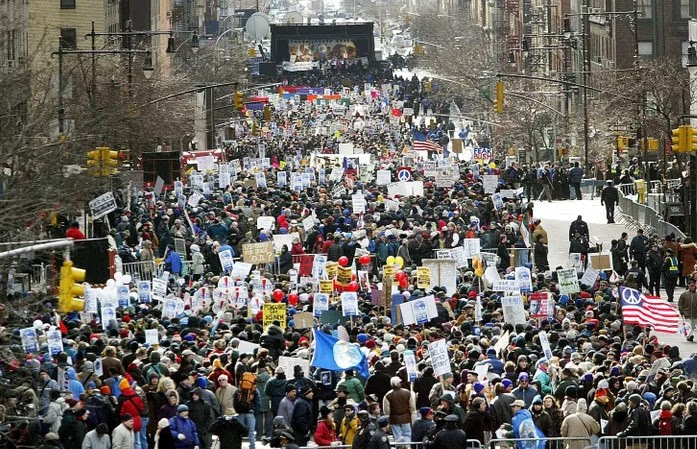Debra Sweet | Feburary 14, 2023
Readers of this message are uniformly horrified at the suffering of the Ukrainian people over the last year in what I believe is a proxy war between Russia and the U.S. that has killed and harmed so many. I’ve heard from some of you who say we have no choice but to support any/all actions the U.S. takes to stop Russia in hopes that the U.S. can be a force for good in this case; others are not only opposed to this war, but to all wars. Many are deeply conflicted over the possibility of this conflict going global/nuclear in scope, to the point of feeling paralyzed, particularly as the prospect of the U.S. colliding with China looms.
This week, I read articles by two people who are thinking about the interests of global humanity, and who are both studying what the war-makers and their critics are saying, and asking important questions. I hope you’ll read the full articles.
Revcom.us published a letter from a reader, Big Bangs, Red Lines, “MAD”… and Wrenching a Better Future for Humanity from the Horrors of Imperialism:
“…The U.S. has steadily escalated the war, and repeatedly crossed and erased supposed ‘red lines,’ getting into ever more dangerous realms of conflict. At each step, the level of violence has grown. Each step taken by one side faces an uncertain response by the other side. At each step the entire situation becomes more unpredictable. Far from bringing stability to the conflict, this approach of incremental escalation makes the entire situation more dangerous. It makes the likelihood of direct fighting between U.S./NATO and Russian forces more likely. It is like walking across an open minefield, knowing full well that each step could bring disaster, but unable to turn back…”
Andrew Bacevich of the Quincy Institute, asks very important questions in Tanks for Nuttin’: Is Civilization at Stake in Ukraine?
“…if Putin is a criminal, how then are we to judge those who conceived of, sold, launched, and thoroughly botched the Iraq War? With the passing of 20 years, has some statute of limitations kicked in to drain that conflict of relevance? My own sense is that the national security establishment is now strongly inclined to pretend that the Iraq War (and the Afghanistan War as well) never happened. Such an exercise in selective memory helps validate the insistence that Ukraine has once more conferred on the United States the primary responsibility for defending ‘civilization.’ That no one else can assume that role is simply taken for granted in Washington…”
 Twenty years ago this week, activists gathered across the globe to oppose the imminent, U.S.-led invasion of Iraq. Between six and ten million people filled the streets on February 15, 2003 in what many social movement researchers would call “the largest protest event in human history.”
Twenty years ago this week, activists gathered across the globe to oppose the imminent, U.S.-led invasion of Iraq. Between six and ten million people filled the streets on February 15, 2003 in what many social movement researchers would call “the largest protest event in human history.”
This week, the International Peace Bureau (IPB), together with partners and supporters, will host an on-line webinar Iraq War Protests +20. Noam Chomsky will speak in Part 02 on Feb. 15 about the reasons behind the Iraq war, the lessons learned and the war’s impact on global developments. Register here for that section.
We Are Not Your Soldiers goes into classrooms throughout the school year bringing the history of U.S. wars to life through the presentations made by veterans. Both the past and the present of U.S. imperialism are largely unknown in society at large and certainly among today’s students. It’s crucial to have that knowledge in order to deal with what is happening now.
On January 20, We Are Not Your Soldiers made its first school visit of 2023 to special ed students at a NYC alternative high school, following up on a previous visit discussing how racism affects Latinx people in the military. This visit focused on racism in Vietnam, towards Black, Latinx and Vietnamese people in connection with Martin Luther King’s Vietnam speech. The two speakers, Joe Urgo and Miguel Gabriel Velazquez, based their presentations on how they came to go to Vietnam, their time there and their experiences after.

